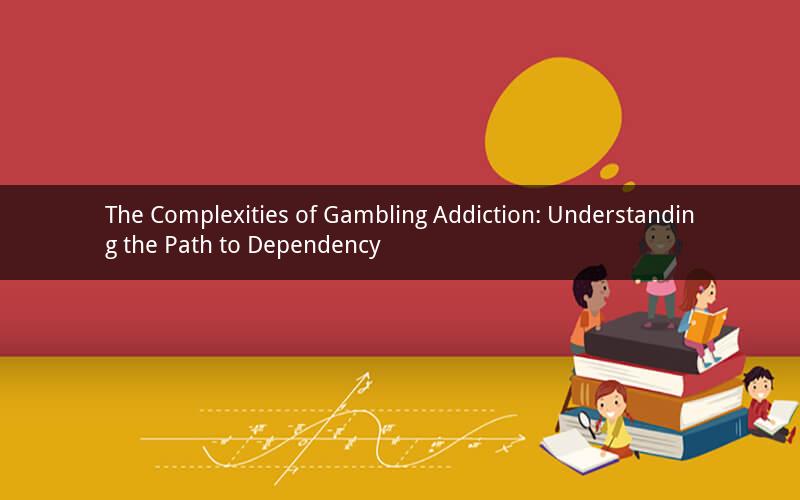
Gambling addiction, often referred to as problem gambling, is a growing concern in today's society. It is a condition where individuals develop an uncontrollable urge to gamble, leading to significant negative consequences in their lives. This article delves into the complexities of gambling addiction, exploring the factors that contribute to its development and the challenges faced by those struggling with this addiction.
1. What are the psychological factors that contribute to gambling addiction?
Psychological factors play a crucial role in the development of gambling addiction. Individuals who are prone to impulsive behavior, have a history of mental health issues, or seek thrill and excitement are more susceptible to developing this addiction. Additionally, individuals with low self-esteem or those who are seeking to escape from emotional pain may turn to gambling as a coping mechanism.
2. How does social influence impact the development of gambling addiction?
Social influence is a significant factor in the development of gambling addiction. Peer pressure, exposure to gambling activities in social settings, and the influence of media can all contribute to the development of this addiction. Individuals who are surrounded by gamblers or who have friends who engage in gambling activities may be more likely to develop an addiction themselves.
3. What role does genetics play in gambling addiction?
Research suggests that genetics may play a role in the development of gambling addiction. Studies have shown that individuals with a family history of gambling addiction are more likely to develop the condition themselves. However, it is important to note that genetics alone do not determine whether an individual will become addicted to gambling.
4. How does the availability of gambling opportunities contribute to addiction?
The availability of gambling opportunities has significantly increased in recent years, with the rise of online gambling and the expansion of casinos. The ease of access to gambling activities can make it more difficult for individuals to control their gambling behavior and can contribute to the development of addiction.
5. What are the signs and symptoms of gambling addiction?
Recognizing the signs and symptoms of gambling addiction is crucial for early intervention and treatment. Common signs include preoccupation with gambling, feeling a need to increase the amount of money or time spent gambling, lying about gambling activities, and experiencing mood swings or irritability when unable to gamble.
Understanding the complexities of gambling addiction is essential for addressing this growing concern. Here are some key points to consider:
- Psychological factors, such as impulsivity and low self-esteem, can contribute to the development of gambling addiction.
- Social influence, including peer pressure and exposure to gambling activities, can also play a significant role.
- Genetics may play a role in the susceptibility to gambling addiction, but it is not the sole determinant.
- The availability of gambling opportunities has increased, making it more challenging for individuals to control their gambling behavior.
- Recognizing the signs and symptoms of gambling addiction is crucial for early intervention and treatment.
In conclusion, gambling addiction is a complex condition influenced by various factors. By understanding these factors and recognizing the signs and symptoms, individuals can seek help and support to overcome this addiction. Here are five questions related to gambling addiction:
1. Can gambling addiction be treated effectively?
Yes, gambling addiction can be treated effectively through various methods, including therapy, support groups, and medication.
2. How can individuals prevent gambling addiction?
Individuals can prevent gambling addiction by setting limits on their gambling activities, avoiding high-risk situations, and seeking support from friends and family.
3. What are the long-term consequences of gambling addiction?
The long-term consequences of gambling addiction can be severe, including financial problems, relationship issues, and mental health disorders.
4. Can children develop gambling addiction?
Yes, children can develop gambling addiction, although it is less common than in adults. Early intervention and education can help prevent the development of this addiction in children.
5. How can society address the issue of gambling addiction?
Society can address the issue of gambling addiction by implementing stricter regulations on gambling activities, providing support and resources for individuals struggling with addiction, and raising awareness about the risks associated with gambling.